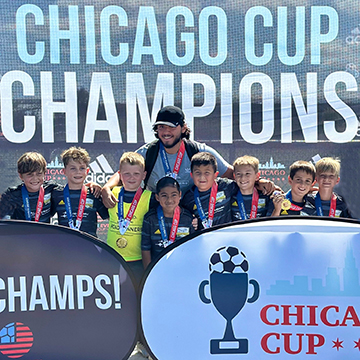Moreno Leans on Communications, Coaching to Excel
On the 11th floor of a square building in Chicago’s Streeterville neighborhood, Anthony Moreno sits at the center of a complex web of regulations, policies, and the documentation necessary to ensure clinical trials are conducted ethically and safely.
“During a study start-up, my main objective is to have a protocol submitted and approved by the IRB of choice as fast as possible,” says Moreno, a regulatory coordinator with the Northwestern University Clinical and Translational Sciences (NUCATS) Institute. “Early-stage work involves communicating with study sponsors, scheduling team meetings, sending documents that are considered essential out for signature, and creating Informed Consent forms that will eventually be used by study teams and read by future study participants.”
The process can be tedious and time consuming, which is why completing tasks in an efficient manner is crucial. Once a study is approved by the IRB, Moreno’s tasks shift to maintaining the research trial.
“I play a significant role because although my duties can seem monotonous and time-consuming, the work I do allows investigators to focus more on the science of their trials rather than the many other factors not directly related to its outcomes,” says Moreno. “Scientific research remains at the forefront of human advancement. Without our historic successes in clinical trials, life would look and feel very different than it does today.”
Communication has always played a pivotal role in Moreno’s life. As a child playing soccer, he found himself part of a team that could only succeed when working together. Today, as a soccer coach and manager of regulatory considerations at NUCATS, he still sees the value in clear, concise communication strategies.

Scientific research remains at the forefront of human advancement. Without our historic successes in clinical trials, life would look and feel very different than it does today.”
“I enjoy communicating with so many different people while educating study teams on the processes required,” Moreno says. “With the support of my manager and great colleagues, I am now capable of starting multiple studies at once and maintaining several at any given time with no issues. I truly feel that I’ve already grown so much at NUCATS.”
Before coming to Northwestern, Moreno worked as a physical therapy aide following his bachelor's degree in Kinesiology and Exercise Science at Lewis University. At Lewis, Moreno continued his soccer career. He now helps coach his boyhood club, the Downers Grove Roadrunners.
“I’ve been blessed to visit several parts of the world through soccer. The greatest trip by far was in 2018 when my club and I traveled to Berlin, Vienna, Budapest, and Prague to play friendly matches against local ‘football’ clubs. The opportunity to travel and learn new cultures, customs, and traditions was one of the greatest learning experiences I’ve had.”
Born in Chicago, Moreno grew up in the Romeoville/Plainfield area, where he still lives today, although he says the city is calling him.
“There is a lot to love about Chicago, from the food, the sports, the atmosphere, the summer activities. The list goes on and on,” he says. “However, the best thing to me about Chicago is that Chicago mentality. The mentality that Chicago is just better. Doesn’t matter what you’re talking about. Everyone buys in and to me that’s the best thing about the city.”
While his coaching duties continue to keep him busy, Moreno recently started playing golf for the first time.
“My road to the Masters Tournament started about a month and a half ago,” he jokes. “I’m quite competitive, so I’m sure that I will stick with the sport for a long time.”
Whether he’s competing or communicating, Moreno is often focused on developing strategies of efficiencies, sometimes telling friends that he works in Northwestern’s unofficial Department of Optimization. The one thing he wishes more people knew about the role of a regulatory coordinator is the “burden my work removes from study teams so that they can pursue pathbreaking discoveries.”
Written by Roger Anderson




